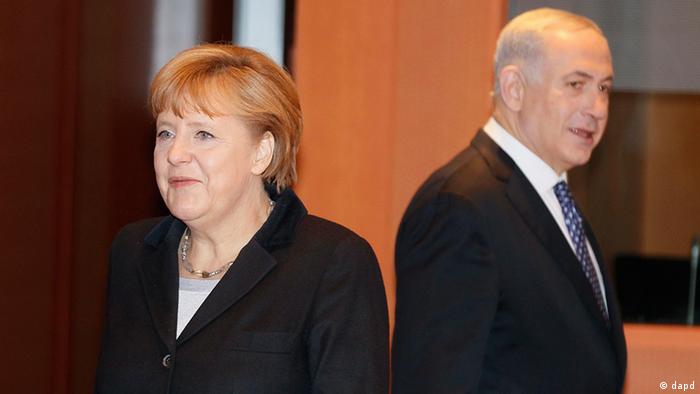As Israeli Prime Minister Benjamin Netanyahu held tough talks with Chancellor Merkel, a veteran of German-Israeli relations tells DW, that despite recent hiccups, ties between the two countries remain strong.
DW: How disappointed is Israel in Germany's abstention at last week's UN vote on Palestinian observer status?
Michael Mertes: I don't think you can say Israel is disappointed. Certainly the Netanyahu government is disappointed but there were people like former Prime Minister Ehud Olmert who spoke in favour of a positive vote for the decision at the UN. I know many people, more on the center-left, who were not against it or who were even in favour.
Netanyahu's disappointment stems from the fact that the Israeli government had not taken seriously enough the many warnings and signals from the German federal government that asked Israel to make some gesture in terms of the settlement policies. These warnings were just not taken into account. The German side didn't get any reaction. I think the Israeli government underestimated the impact of not responding to the German government.
 Michael Mertes
Michael Mertes
The second point is that Germany has been very much in favor of the two-state solution. Next year we have the 20th anniversary of the Oslo agreements, which stipulate the two-state solution as an objective for the Israelis and Palestinians. We are still far away from having a two-state solution. I understand the federal government's position as an expression of concern that the settlement policies of the Israeli side might make a two-state solution more and more difficult to implement.
What are the key issues at stake?
You must make a clear differentiation between Germany's position on Israel's security on the one one side and short-term political disagreements om the other. As for Israel's security, Germany is 100 percent firm, look at the submarines delivered to Israel, look at the very clear position of Merkel on Israel's right to defend itself from rockets from Gaza, and look at the government's position on Iran.
I'm clearly against overemphasizing the recent dispute. This has not really changed the basic German position, the German commitment to Israel's vital security interests. But I understand the German government is concerned that the settlement policies will just make a two-state solution impossible. Merkel said it very clearly.
What is changing is the attitude of the German public. This is clear in public opinion polls. If you look at the German political class, then you still have a strong support of Israel and I don't see that changing. But if you look at the German public at large, I think there is a change of attitude toward Israel. People are getting more critical.
In the past discussions took place behind closed doors. There is a new style of communication, that you speak out publicly, between Germany and Israel. I cannot remember having seen such an open way of communicating each other's frustration. It's a matter of style, not substance.
Germany is Israel's best friend in Europe. If Germany is feeling frustrated wth Israel and abstaining from the UN vote, what does that say about the other European countries?
What is very clear is that the German reaction, compared to the British, French, or Swedish reactions, has been a very mild response. Germany is still very pro-Israeli compared to other Europeans. What might become a challenge is that the EU needs a common stance toward the Middle East and what we have seen until now is that there are very different positions among the EU countries. Germany has always been supportive of speaking with one voice at the European level, which is why it might try to influence European politics to have a joint response not only to the Israelis and Palestinians but also to other parts of the Middle East.
Is this a crisis?
It's not a crisis. But it shows that those responsible not only in Germany but also in the US, if you look at what Hillary Clinton said, are very concerned that there might be only one chance left for the two-state solution. The 20th anniversary of Oslo is next year, and there are more and more people in Israel and the Palestinian territories who say Oslo has "failed."
I think there is a strong sense of urgency in many Western capitals that one has to try again to implement the two-state solution because if it is not done in the foreseeable future then it might become impossible.
Haven't people been saying that for years?
A friend of mine who lived in Israel told me he used to say years ago it was five minutes to noon. It still is. I do hope it is not five minutes past noon.
Michael Mertes has headed the Jerusalem office of the Konrad Adenauer Stiftung, a German think-tank with ties to Chancellor Angela Merkel's Christian Democratic Union party, since 2011. Earlier he served as State Secretary for Federal, European and International Affairs in the State government of Nordrhein-Westphalia. Mertes worked from 1984 to 1998 for the federal government under Chancellor Helmut Kohl. DW DE

No comments:
Post a Comment